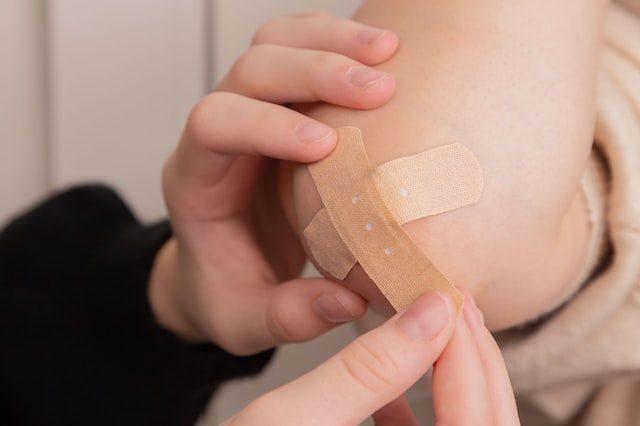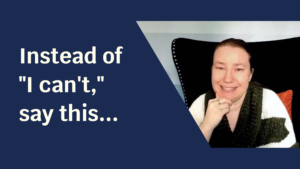“I know what’s wrong with me,” I said
Right after I figured out I’m autistic, I walked into my next therapist appointment and excitedly announced, “I figured it out. I know what’s wrong with me.” She calmly replied, “Autism,” and my first reaction was, “What the hell? You knew? Why didn’t you tell me???”
Looking back, I find it interesting that the way I phrased it, “I know what’s wrong with me” was, in many ways, the exact opposite of what I meant.
As soon as I understood what was going on, what I felt was immense relief that I wasn’t broken.
I went on to explain in that appointment that I finally felt like there’s nothing wrong with me. I’m just wired differently. This “autism thing” explained so much of my life that I didn’t have an explanation for before.
For so many years, I had felt like there was something wrong with me that I couldn’t figure out, couldn’t explain, and had been frustrated that I didn’t know what it was. But as soon as I understood what was going on, what I felt was immense relief that I wasn’t broken. I wasn’t fundamentally flawed. I was just one of those people who was wired this way instead of that way.
I’ve heard this kind of reaction from so many people since then: my fellow autistics.
We often feel relief at finally having an explanation for so many things in our lives, but also a backlash against the wrongness we had internalized for so long.
“I’m not broken” becomes a mantra. A rallying cry. Shouted from the proverbial rooftops. I’d like to explore that for a moment.
The bias against difference
So much of our society is set up with the implicit bias that what’s normal is right, or how things ”should be.” You should do this or that but not anything different. This is how you should learn, work, parent, think, act, dress, talk, love, pray, be. And when you’re not like that, or when it takes a lot of work to pretend you are, it must be because there’s something wrong with you.
Society tries to cure that wrongness, medicalize it, and pathologize it. There’s still a lot of talk in conventional autism circles around “treatments,” with ABA being the most common and extreme version of using control as a means to “normalize” people.
Doctors and psychiatrists prescribe pills to make our brains work more typically, and even when they are useful, it still speaks to how we medicalize neurological differences.
There’s still stigma around psychotherapy, as if being a human with emotions, pain, and trauma is a personal failing for not be strong enough to not be affected by the bad things that happened to you.
We try to push down the fear that society is right, and maybe something really is wrong with us.
And if we can’t make it go away, we at least try to hide it so the neighbors can’t see. As autistics, we mask our weirdness, try not to be too quirky, try to say and do the right things so we won’t stand out and be subjected to criticism, or resign our souls to the painful thought that we will never fit in or be accepted for who we are.
We hide the stress of being different (wrong, abnormal) behind staying busy, or kids, or work, or other socially acceptable excuses. We try to push down the fear that society is right, and maybe something really is wrong with us. We use use phrases like, “don’t worry, that’s normal,” as if being normal is the same as acceptable.
I vehemently protest any suggestion that I am broken as a person. And yet I can’t deny that all those years of searching were because I did want some help. That not everything was perfect, and I wanted certain things to get better.
Yes, I do want to feel better
After my autism diagnosis, I found no services available to adults, yet reading about autism gave me some ideas of what to work on.
I started looking at sensory stuff, noticing that I had sensory needs that I had blocked out for decades. I got back into an old special interest cluster: psychology, neurobiology, and sociology, and I started understanding people and relationships in new ways.
I have been hurt by people and by circumstances. It hurt at the time, it hurt later, and it changed how I interacted with people.
Also, the work with my therapist became a lot more focused on (slogging through) my grief and anger at what could have been. We worked through the complex traumas of being misunderstood, gaslit, and the practical effects of that in daily life. She also, gradually, laboriously, convinced me that I had emotions, and that they might be useful sources of information. It’s been a long road, and often uncomfortable, but it has been so worth it.
I still won’t say that I’m broken, but I am wounded. I have been hurt by people and by circumstances. By all the shit that happened and the good things that didn’t happen, and the support that I didn’t get at the times that I needed it most. The misunderstandings, the lack of understanding, and all that stuff. It hurt at the time, it hurt later, and it changed how I interacted with people, and not always in ways I’m proud of.
I have been hurt
But here’s the deal. A wound is an injury. It’s something foreign to the body. It’s not saying that my body is wrong, or that my brain is wrong, or that I am wrong. There’s no shame in being wounded.
It’s something that happened to me. It wasn’t my fault. But I still have the wound. And I still have to do what it takes to heal if I want to feel better.
It’s something that happened to me. It wasn’t my fault. But I still have the wound. And I still have to do what it takes to heal if I want to feel better.
I heard this great analogy once, and I forget who said this so I apologize for not giving credit. They were talking about taking radical responsibility for everything in your life, and I was kind of pissed at the idea that anyone would think I’m responsible for any part in the traumas I had been through.
And this person said that it’s not about being responsible for the trauma, but taking ownership of the healing process. They compared it to standing in your own driveway, minding your own business, and a car swerves out of the street and runs into you and it breaks your leg so you have to go to the hospital.
That really, really sucks. There’s pain, probably anger, life upheaval, all of that. And it all sucks.
And let’s be absolutely clear: it wasn’t your fault you got hit by the car.
Yet no matter how genuinely, deeply remorseful and sorrowful (the root of our word sorry) the driver is, they can’t heal your leg for you.
Let’s imagine this person is so grief stricken that they go above and beyond to “make things right.” They take you to doctor’s appointments and physical therapy. They pay for your expenses, help you out at home, wait on you hand and foot. Yet no matter how invested they are in helping you get better, you still have to go through the healing yourself.
No matter how invested they are in helping you get better, you still have to go through the healing process yourself.
No one can take that away. No one can do it for you. No matter how much it sucks, you still have to be the one to do the physical therapy exercises, stretch the muscles, walk on the leg, do the healing work, and you’re still the one living with the pain each day.
And if you refuse, if you are so fixated on their fault that you won’t take the pain meds, do the exercises, go to the appointments; if you sit there and complain about how much it hurts and how awful they were to run you over, well, they might feel even more guilty, but its not making your leg any better. You’re still suffering (and probably worse than they are).
It is up to you to do what it takes to heal your leg.
My own healing work
My autism isn’t something that’s wrong with me. And yet I have been hurt many times because the world is not set up to automatically accommodate how I think and work and learn and react and communicate most naturally.
And no one can take away, or heal, those hurts besides me. They’re not my fault, but I still have to do the work to heal.
No one can take away, or heal, those hurts besides me. They’re not my fault, but I still have to do the work to heal.
I’m not broken, but I have been wounded, and I want to heal those wounds. I want to feel better.
But here’s the really tricky part. Healing wounds usually hurts a bit more for a while.
Healing can be painful
In a physical wound, like a cut, you need to pour antiseptic over it to clean the wound so it won’t get infected. If you fall from a bike and skin your knee, there might be gravel or dirt in it too, and that needs to be cleaned out in order for it to heal. Sometimes you can do that yourself, and sometimes it takes the help of someone else: a parent, nurse, or doctor.
Similarly for emotional wounds, a therapist or friend or someone you trust can be really helpful to help you clean out the wound. Especially when it has festered and “cleaning it” stings.
Having someone to help you through the process is invaluable, but they can only help. They can’t do it for you. You still have to do hard work and it is sometimes deeply uncomfortable, especially around the experiences that created anger, resentment, and traumas.
Because it means facing things you’ve been avoiding thinking about, and there are very good reasons why you don’t want to think about that stuff.
It’s also worth clarifying that bringing it up to rehash it, complain, or because someone is curious, isn’t necessarily healing, and sometimes can re-traumatize you.
It becomes healing work when you are with someone who you feel safe with, who can help you face it without being triggered, and process the emotions, reframe what happened, and understand the situation and yourself in a new way. Done with compassion and grace, it can be transformative.
They become healing when they foster deep inward compassion leading to renewed (and new) outward connections with the world.
And just like antiseptic on a scraped knee, the sting of it can be sharp in the moment, but it doesn’t last very long when you have someone who’s good at this helping you through it.
Yet it doesn’t always have to be with a person; sometimes extended time in nature, expressive or vulnerable writing, guided psychedelic experiences, some kinds of rituals, and other life experiences can also have transformative effects. The common theme seems to be that they become healing when they foster deep inward compassion leading to renewed (and new) outward connections with the world.
Beautiful scars
Once that wound is cleaned out, it can begin to genuinely heal.
Yes, it may leave a scar; signs that something happened. You don’t forget it. But the memory won’t be as intense, or as triggering, and it will gradually fade into one more complicated memory that over time will weave into the tapestry of your life, and it will let you move on to weave more threads—beautiful threads—into your life.
In my own experience, doing that deep healing work sucks in the moment but is sooo worth it.
I want that feeling of freedom that I have come to associate with genuine healing.
I’ve actually gotten to the point where I look forward to it because I’ve had the experience enough times now that I know that when I face that thing that’s really hard to face, I’m going to feel so much better very soon, and afterwards everything will feel easier, and I want that feeling of freedom that I have come to associate with genuine healing.
I want each of my wounds to be healed, to scar over, and to give me back full use of that part of me that had been stuck ever since it got hurt (often for decades). And every time that happens, I become more fully, genuinely, wholly, my neurowonderfully autistic self.
So no, I am not broken. But I have been hurt. I still have some open wounds, but far fewer, and my life is getting better and better with each beautiful, healed scar. I look forward to what will heal next.




